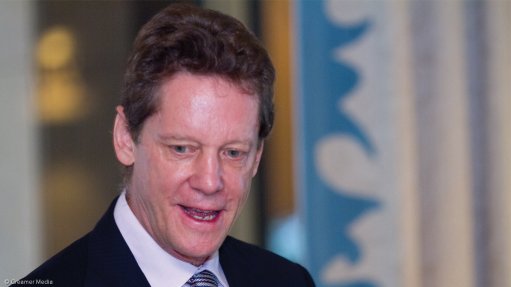
Ivanhoe Mines executive chairperson Robert Friedland
Photo by: Duane Daws
TORONTO (miningweekly.com) – Legendary mining entrepreneur and self-made billionaire Robert Friedland ran the risk of inflaming tension in South Africa at a very sensitive time for platinum miners with his recent “fireside” remarks that underground platinum miners in the country were underpaid, market analysts at SP Angel, in London, said on Friday.
Political leaders and mining companies have worked hard to restore peace and jobs to the platinum sector after the Marikana incident, where tensions whipped up by competition between mining unions the Association of Mineworkers and Construction Union (AMCU) and National Union of Mineworkers (NUM) resulted in a confontation with police that left scores dead.
More specifically, the Marikana miners' strike, or Lonmin strike, was a wildcat strike at a mine owned by Lonmin in the Marikana area, close to Rustenburg, South Africa, on August 16, 2012.
The events that ensued garnered international attention when a series of violent incidents involving the South African Police Service, Lonmin security, the leadership of AMCU and NUM and strikers themselves, resulted in the deaths of 44 people, the majority of whom were striking mineworkers. At least 78 workers were also injured.
The analysts said Friedland’s comments that underground platinum miners were underpaid for the job they did were “irresponsible in our view”.
Platinum miners were generally paid more than the entry-level wage of R8 700 ($870) a month, as well as production bonuses for face work. For example, the analysts noted that platinum miners were generally paid some three to four times the $12 a day quoted by Friedland, adding that the purchasing power of $1 in South Africa, was about ten times that in the UK.
“You can argue that many miners around the world are underpaid considering the risks and working conditions. You could equally argue that the creation of highly paid jobs compared with other work on offer in South Africa and in the local platinum area community is good for the community and good for the nation as a whole.
“Where would South Africa be without the millions of jobs created in and around South Africa’s mines,” analyst John Meyer wrote in a note to clients.
He added that it was easy for someone planning a large-scale opencast operation to criticise underground mining, but Friedland’s Ivanplats mine, in the Limpopo province, would employ relatively few local workers and the working conditions would be entirely different.
“You cannot turn large-scale underground platinum mines into opencast, or vast mechanised mines, and you may not sell platinum for twice the current price in the current market environment. Platinum users will switch to using less metal or other metals in many instances if prices rise by much,” Meyer said.
South African President Jacob Zuma and the platinum miners were indeed focused on improving safety, with every fatality properly investigated and new measures put in place to reduce such incidents.
“We are sure that Friedland will have miners queuing up for jobs at his Platreef project; sadly we suspect Platreef will not be able to afford the wage bill for every miner who turns up looking for better paid work,” the analyst said.